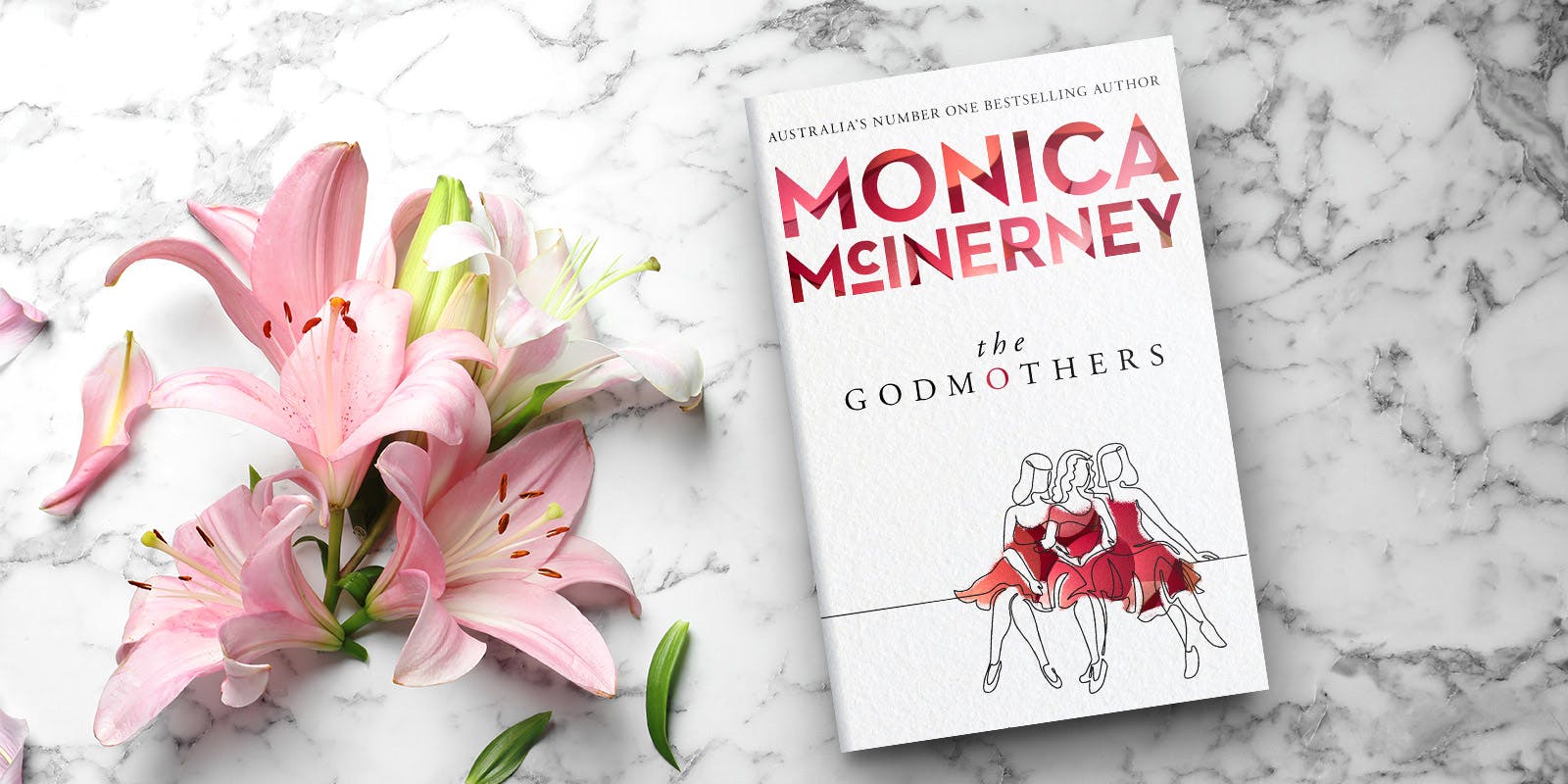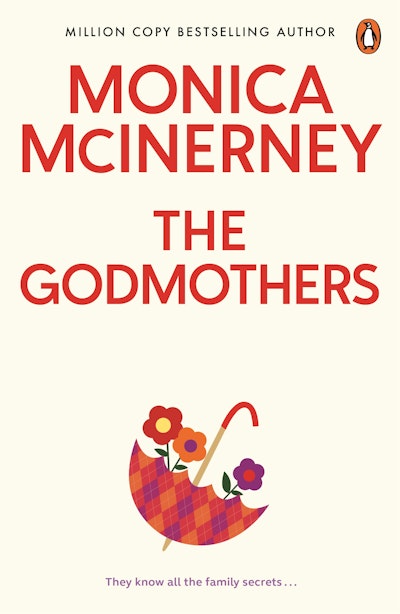Monica McInerney on the family secrets, overseas trips and strange times that shaped her heartwarming new novel.
The question I’m most often asked about a new novel is 'what inspired it?' With The Godmothers, the seeds were planted by two family stories. One is from my childhood, the second more recent.
In 1957, my father’s half-sister, then aged 44, drowned in an underground water tank on the family farm in South Australia. As a child, I always sensed there was more to it than an accident. My father said he didn’t know, but I felt sure his other sister – who was my godmother – did. Despite my best efforts, though, she never spoke about it with me. When she died in 2008 any secrets went with her.
More recently my big sister’s best friend gave her a bound collection of their emails and letters, written over five action-packed years while they were in their 30s. In it, they – apparently – discuss their friends, families and relationships in forensic detail. My sister has made her husband promise to destroy that book if anything happens to her, so no one else can read it – especially her four children and six siblings. (Of course, that makes me really want to read it.)
As a writer, family secrets have long fascinated me. I’m particularly interested in the stories that one generation keeps from the next. The Godmothers is a family mystery – 30-year-old Eliza is in search of the father she’s never met and the truth about her mother’s troubled life – but it’s also a story of moral dilemmas. Is it always better to tell the truth? Or is it sometimes better – kinder – to lie?
The Godmothers took me two years to write, research and edit. Before I wrote a word, I spent several months imagining every detail of my main characters’ lives: Eliza; her troubled mother Jeannie, and her godmothers Olivia and Maxie, Jeannie’s two best friends. I wanted to explore the idea and role of modern godmothers. Once a religious relationship, it’s become one of support, friendship and guidance, special because it is a chosen position. In the novel, the young Eliza grows up secure in the knowledge of her mother’s love, knowing she is also loved and watched over by her two godmothers – until a tragic event changes her life.
I’m intrigued by how we can be shaped by dramatic events, be it grief, love or trauma. I also like to unexpectedly take my characters out of their normal lives into new situations, cities and sometimes countries. Soon after The Godmothers begins, Eliza is catapulted out of the safe, organised, lonely life she’s deliberately built in Melbourne. She finds herself in the middle of a complicated family in Edinburgh, with her two godmothers beside her. As she slowly begins to ask questions about her life, her father and mother, the answers surprise her – and her godmothers too.
The Godmothers is set in Australia, Scotland, England and Ireland. My novels often feature several international settings, possibly because I’ve moved many times in my life, from the Clare Valley of South Australia to Adelaide, then London, Sydney, Melbourne, Tasmania. I’ve travelled widely too. For the past 30 years, my Irish husband and I have moved back and forth between our two home countries. I know well the promise and excitement of travel, of arriving in a new city or country, starting a new life. (Even if that feels on pause now in pandemic times.)
I’d visited an old friend in Scotland just before I began writing The Godmothers and knew from the start that Edinburgh would be Eliza’s first destination. My husband and I made a research trip in April 2019, while the plot was still unfolding for me. I did a second fact-checking trip with my 18-year-old Australian niece Ruby in January this year, final manuscript in hand, checking off all the geography and descriptions. We went everywhere Eliza does in the story – the street in Haymarket where her godmother Olivia lives in the fictional Montgomery Hotel; along the Royal Mile; to Edinburgh Zoo, Waverley Station and the Botanic Garden.
I researched the novel’s other locations too, including Gretna Green, the famous eloping town on the Scottish/English border, where I watched wedding parties stroll about as the characters do in the novel. I walked around London’s Mayfair, choosing the right street and house for Maxie, Eliza’s other godmother. I spent hours in the Tate gallery, choosing a painting that is special to two characters. I made several trips to a location in Ireland that becomes important to Eliza (no spoilers, I promise.) I’d been there often before, but I had to imagine it through Eliza’s eyes, as if there for the first time.
I wrote The Godmothers at home in my attic office in Dublin, through the changing seasons. Some days rain lashed against the skylights above me. One week there was snow. In spring I wrote to the sound of seagull chicks sliding and scratching on the roof tiles above my desk. In summer, I worked to the roars of the crowd at nearby Croke Park, Ireland’s largest sports stadium.
I expected to do the final edits in that Dublin attic too. But life imitated art for me this year, as I found myself swapping the familiar for the unexpected. In March I was back in South Australia visiting my Mum and family when the pandemic hit, borders closed and flights were grounded. I found myself stranded in Adelaide, and have been staying – and working – in my Mum’s tiny spare room ever since. Thankfully, she was instantly welcoming to her surprise new flatmate. I’ve been so grateful for daily video calls to my husband back in Ireland too.
It felt very strange at times to be editing The Godmothers in such different surroundings, against the backdrop of a pandemic and a changing world. Some chapters felt more like fantasy than fiction, as my characters took crowded international flights, moving easily from one country to another. But falling back into my imagination also became a welcome distraction from the uncertainty of real life.
While here in Adelaide, I’ve finished writing my first children’s book, Marcie Gill and the Caravan Park Cat, being published by Puffin in April 2021, illustrated by Danny Snell. It’s a family story with magic ingredients, for readers aged ten and under. I liked the unexpected coincidence – it’s set in coastal South Australia and now was partly written in South Australia.
I’ve also started work on my next adult novel, even as The Godmothers is being published. All sorts of characters, settings and emotions are weaving together, as my new story emerges. So far it’s not about a woman living unexpectedly with her mother after 30 years living overseas. It’s not about a pandemic, or a couple unexpectedly separated due to world events either. But it is about a family and secrets and it will have lots of different international settings.
I’m hoping it will soon be possible to make location research trips again. But for now, it’s another journey that is uppermost in my mind. One booked for mid-November. A long-awaited flight back to my husband in Dublin.













